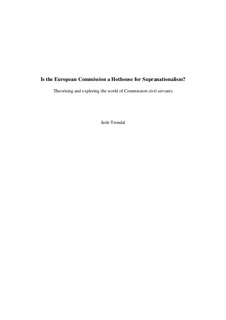Is the European Commission a hothouse for supranationalism? : theorising and exploring the world of Commission civil servants
Working paper
Permanent lenke
http://hdl.handle.net/11250/134883Utgivelsesdato
2005Metadata
Vis full innførselSamlinger
- CES Working Papers [28]
Sammendrag
Does the European Commission (Commission) manage to transform and re-direct the roles played by Commission civil servants? To test the old neo-functionalist claim on loyalty transfer among civil servants, this article provides fresh survey and interview data on seconded national experts in the Commission. The transformative powers of the Commission are tested by assessing the extent to which seconded national experts adopt supranational role perceptions. Theoretically, the emergence of supranational role perceptions is accounted for by considering (i) processes of pre-socialisation outside the Commission, (ii) processes of resocialisation inside the Commission, and (iii) organisational incompatibility between the Commission and domestic ministries and agencies from which the secondees originate. The empirical analysis shows that secondees evoke multiple loyalties, notably towards own profession, own DG and Unit and towards the EU and the Commission as wholes. Crucially, the data reported demonstrate that the Commission indeed instils supranational role perceptions into secondees. This observation reflects processes of re-socialisation inside the Commission, the organisational composition of the Commission as well as organizational incompatibilities between the Commission and domestic ministries and agencies. The data does not report robust evidence of pre-socialisation outside the Commission. Hence, the Commission is indeed a ‘hothouse for supranationalism’.
